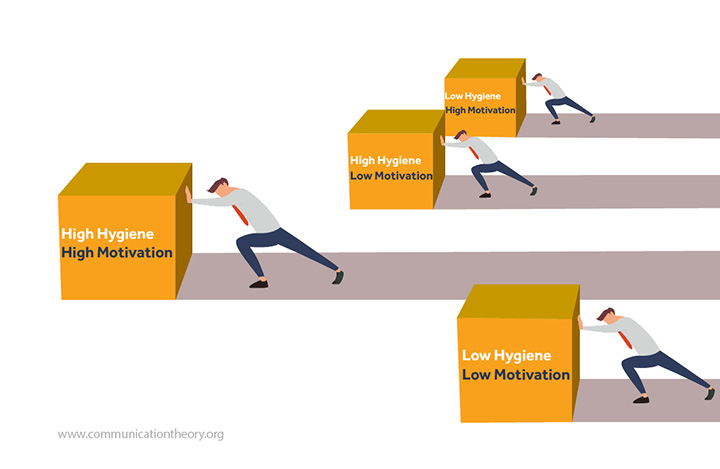“Motivations lead to job satisfaction“. – Fredrick Herzberg
Anything one does need motivation, be it getting motivated to do the job or accomplishment that is achieved on the job completion. Proper motivation and satisfaction are needed to stimulate the person on the work front to achieve the goals. Such motivations lead to job satisfaction.

©[peshkov]/Adobe Stock
What makes a job satisfactory?
Fredrick Herzberg was a psychologist who came to be interested in the behavioural patterns of the people when doing the job. He noticed that the attitude of the people in the working environment differs which also affects the achievement of job goal and employer/employee job satisfaction. The right balance on the environment and attitude helps to have a completely satisfactory job.
Herzberg in 1959 while observing a group of workers proposed the two-factor model or hygiene motivation theory.
Hygiene Factor
Hygiene factor does not mean ones’ personal hygiene and cleanliness even though it can disrupt the output to a minimal extent. Herzberg’s hygiene factor means job satisfaction that is necessary to get the motivation in the work area. These are the very basic factors that essentially run the workplace. Lack of such factors can lead to dissatisfaction in the environment.
To name a few of the hygiene factors:
- Pay scale: Being underpaid than peers can demotivate the worker to continue working.
- Work ethics: Competitive work ethics can not only motivate the team to perform well against others but also help in doing self-analysis on how far they are from peers.
- Job Security: Having a constant threat to the role that the worker is handling can cause serious discomfort and dissatisfaction to work there.
- Administrative Policies: Company policies that are flexible that works to the mental and health benefits of their employees help them to get give a better job output.
- Employee Benefits: Perks or benefits that employee reaps, plays an important role. Imagine not being able to attend to the family while the family is having a tough time through illness/death can cause demotivation to work.
- The rapport between the employees: An amicable relation with the team works a lot in favour of job output.
These factors may be a short-term motivation but it is required that these basic factors full filled for the employees to have psychological satisfaction.
Motivation Factor
Motivation is the second factor mentioned by Herzberg. There are certain things that push the employee to extend their limit and such is the motivation factor. The list below can be some of the factors that can possibly motivate the employee to do a better job.
- Job Growth: When an employee joins a company he as well looks for the scope of growth within the company. A constant growth both in job knowledge, training & orientation on job role helps in motivating the employee performance.
- Job Variety: Job variety doesn’t mean trying a hand on different types of jobs but a role expansion. An essential factor that comes with a job is expansion. Naturally raising the managing responsibility of the employee, this challenges the employee on his capacity to manage things better.
- Job Recognition: Timely recognition for the job well done does a better motivation to an employee than anything. The job recognition can be from notifying coworkers on the achievement, bonus salary, increment, achievement perks, awards, certificates etc.
Combinations of Two Factors
The two factors come with 4 different combinations of satisfaction and non-satisfaction at work.

Limitations
- Herzberg theory prioritizes the job satisfaction of the employee than productivity.
- The theory as well ignores the variables that might arise in unpredictable situations.
- The predicaments on job satisfaction measurement are only on theory.
Application of the theory on the Industrial Scenario
In the industrial/corporate workspace, both the employer and the employee meets job satisfaction when there is a clear understanding of what the employee needs to fulfill the job with the necessary quality.
On, the viewpoint of an employee when he enters a company he looks for a place to learn and implement the skills learnt during the period of education. Salary and other benefits take a secondary level. While learning and achieving the skills, the employee takes cognisance of the rise in salary, allowance, etc.
Working on team spirit and teamwork: No best teams are made overnight. Through the constant trial and error, learning about each member’s work handling capacity of the job assigned. While being on the team brings a discrepancy, misunderstandings, competition, and hatred.
Recognition: Getting the job done best, being a good performer, having team relationship in achieving goal helps the company. But what helps the company further is giving out a proper recognition on the employee’s achievements.
Recognition can be anything from salary increment, an annual bonus, quarter achievement pay by performance comparisons, send an email to all the employees to let them know of the achievement, a pat on the back, dinner/lunch party, 2 days paid holiday, promotion etc. Anything that gives the employees a feeling that all their hard work has paid off.
A proper recognition help in boosting the confidence of the employee further making sure he performs well as well. After a great place to work is where both employer and employees have complete satisfaction on the job.
Conclusion
In spite of the limitations and criticisms, the theory is used widely. And to use the theory within the team, one can start by eliminating the hygiene factors one by one and replacing it with motivating factors.
It can surmise that employee capabilities, skills can be utilized to the maximum by properly balancing out the hygiene and motivation factors to keep them motivated throughout. Henceforth, seeing an increase in the quality of work.
I am interested in your ideas. I am doing an in-depth paper and teacher-parent communication and find this very interesting. I am wondering how I can use some of your information in my research.